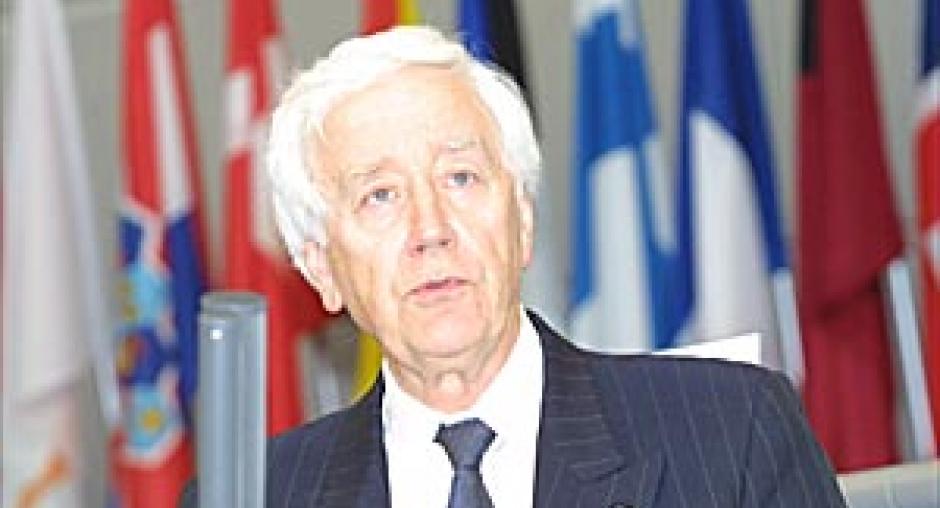Newsroom
Enlarged Europe needs protection for minorities, says OSCE Commissioner
THE HAGUE 5 November 2002

Mr. Ekeus called on participants in the European Convention to reflect on EU standards for protecting national minorities. (OSCE) Photo details
THE HAGUE, 5 November 2002- "The European Union cannot ignore minority-related issues on its own turf", Rolf Ekeus, the OSCE High Commissioner on National Minorities, told a conference on national minorities in the enlarged European Union, hosted today in Copenhagen by the Danish EU Presidency.
He cautioned that while the threat of violent conflicts would probably be reduced in an enlarged Europe, "other inter-ethnic issues of governance will persist, possibly becoming more complex".
"Now is the time to start thinking about this challenge", said the High Commissioner, "especially in the context of the on-going dialogue on the future of the Union".
Mr. Ekeus called on participants in the European Convention to reflect on EU standards for protecting national minorities. While recognizing the importance of the Copenhagen criteria for ensuring respect and protection of minorities in accession countries, he pointed out that the standards were less clear for EU members.
"Surely the standards on which the Copenhagen criteria are based should be universally applicable within and throughout the EU, in which case they should be equally - and consistently - applied to all Member States".
The High Commissioner noted that an imbalance in terms of applicable standards within the Union would be "inconsistent with declared EU values and raise serious doubts about the normative foundations of the EU itself".
He therefore stressed the importance of anti-discrimination legislation and the protection of minority languages. On anti-discrimination, he highlighted the importance of the EU's Race Directive and Protocol 12, additional to the European Convention on Human Rights, but called for a "clear and complete anti-discrimination provision in an eventual new European Charter or other treaty which might emerge from the European Convention".
Concerning language use, the High Commissioner pointed out that Article 13 of the EC Treaty [which prohibits discrimination] did not include "language" among its grounds. "This conspicious shortcoming needs to be addressed to ensure that, in a transformed Union, all Europeans will enjoy full equality and that Europe will maintain the full extent of its rich linguistic diversity which is both an essential part of European identity and a tremendous human resource," he said.
Mr. Ekeus concluded that "integrating diversity is and will remain one of the greatest challenges for the EU... if we fail to act responsibly, that diversity could be a source of tension within our cities and States and across borders - and so the European project will be jeopardized". He said he was confident that this could be avoided, "while building both a larger and better European Union".
The full text of this speech can be read on the High Commissioner on National Minorities' section of the OSCE website at www.osce.org/hcnm
He cautioned that while the threat of violent conflicts would probably be reduced in an enlarged Europe, "other inter-ethnic issues of governance will persist, possibly becoming more complex".
"Now is the time to start thinking about this challenge", said the High Commissioner, "especially in the context of the on-going dialogue on the future of the Union".
Mr. Ekeus called on participants in the European Convention to reflect on EU standards for protecting national minorities. While recognizing the importance of the Copenhagen criteria for ensuring respect and protection of minorities in accession countries, he pointed out that the standards were less clear for EU members.
"Surely the standards on which the Copenhagen criteria are based should be universally applicable within and throughout the EU, in which case they should be equally - and consistently - applied to all Member States".
The High Commissioner noted that an imbalance in terms of applicable standards within the Union would be "inconsistent with declared EU values and raise serious doubts about the normative foundations of the EU itself".
He therefore stressed the importance of anti-discrimination legislation and the protection of minority languages. On anti-discrimination, he highlighted the importance of the EU's Race Directive and Protocol 12, additional to the European Convention on Human Rights, but called for a "clear and complete anti-discrimination provision in an eventual new European Charter or other treaty which might emerge from the European Convention".
Concerning language use, the High Commissioner pointed out that Article 13 of the EC Treaty [which prohibits discrimination] did not include "language" among its grounds. "This conspicious shortcoming needs to be addressed to ensure that, in a transformed Union, all Europeans will enjoy full equality and that Europe will maintain the full extent of its rich linguistic diversity which is both an essential part of European identity and a tremendous human resource," he said.
Mr. Ekeus concluded that "integrating diversity is and will remain one of the greatest challenges for the EU... if we fail to act responsibly, that diversity could be a source of tension within our cities and States and across borders - and so the European project will be jeopardized". He said he was confident that this could be avoided, "while building both a larger and better European Union".
The full text of this speech can be read on the High Commissioner on National Minorities' section of the OSCE website at www.osce.org/hcnm
